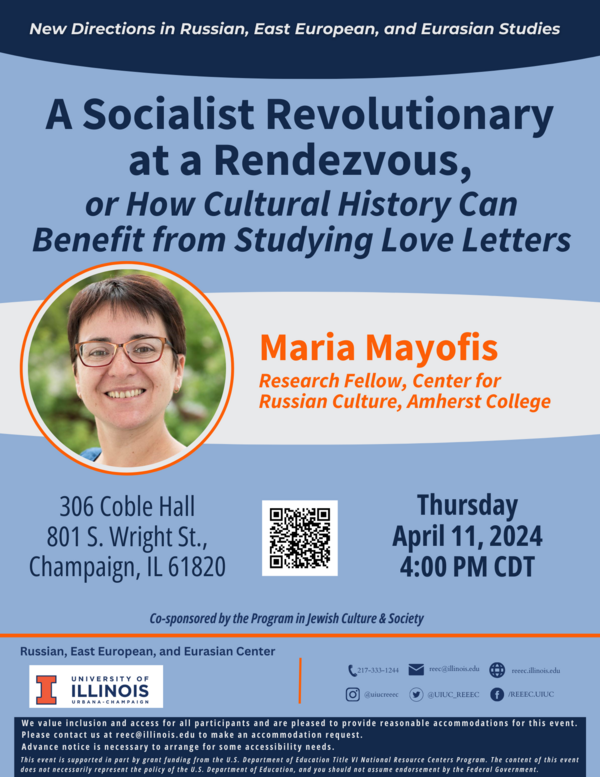REEEC New Directions Lecture: Maria Mayofis, "A Socialist Revolutionary at a Rendezvous, or How Cultural History Can Benefit from Studying Love Letters"

- Sponsor
- Russian, East European, and Eurasian Center; Program in Jewish Culture & Society
- Speaker
- Maria Mayofis (Research Fellow, Center for Russian Culture, Amherst College)
- Cost
- Free and open to the public.
- Contact
- REEEC
- reec@illinois.edu
- Views
- 314
- Originating Calendar
- Russian, E. European & Eurasian Center: Speakers
This presentation will be focused on the correspondence between one of the most active members of Russia's Socialist-Revolutionary Party, journalist and politician Vladimir Zenzinov (1880-1953), and his beloved Amalia Fondaminskaya (1882-1935). Amalia was the wife of another prominent figure of the same party, Ilya Fondaminsky (1880-1942). This correspondence spanned several decades. These letters, preserved in the archive of the Amherst Center for Russian Culture, have never been the subject of scholarly investigation.
The love affair between Amalia and Zenzinov began in the early 1900s. Due to Zenzinov's frequent arrests and exiles and Amalia's emigration in 1907, they could meet quite rarely. Thus, their letters can be viewed and analyzed from several angles: as a form of communication based on building and maintaining close emotionally charged relationships and as an attempt to conduct a specific cultural and psychological experiment. While the studies of the era of Russian modernism have so far focused on radical transgressive sexual practices invented and developed by writers and artists, much less is known about the emotional and literary patterns that became vital sources for the revolutionary circles. My research aims to fill this gap.
Maria Mayofis is a literary scholar and cultural historian, currently working as a research fellow at the Center for Russian Culture at Amherst College. She received her Ph.D. in literature from the Russian State University for the Humanities in 2002. From 2000-2010, she was an editor of the "history" rubric of the New Literary Observer (NLO) journal in Moscow, Russian Federation. From 2011-2022, she taught in several Russian higher education institutions, including the Higher School of Economics, Moscow. She left Russia in early March 2022. Her first monograph was devoted to the literary communities of the early 19th century. Her second research field is the cultural life of the Late Stalinist and the Thaw period. There is one specific research perspective common to her 19th and 20th-century studies: how established emotional patterns and narrative forms contribute to the creation of new micro-social ties, such as love, friendship, and professional collaboration.